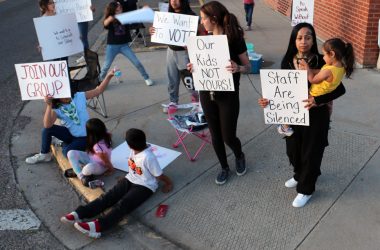
An image of the coronavirus from the federal Centers for Disease Control and Prevention.
UPDATE: This story has been updated to include new information about Oregon university restrictions and the treatment of a Marion County case.
The number of people diagnosed with COVID-19 in Oregon increased to 19 after the Oregon Health Authority on Wednesday announced four new cases in various parts of the state.
The Health Authority confirmed one individual in each of Polk, Marion, Umatilla and Deschutes counties have test results indicating they are infected with novel coronavirus. The results mean that Polk and Deschutes counties have seen their first cases and the virus has now spread to nine Oregon counties.
Salem Health reported Thursday that one cases is being treated at Salem Hospital.
“Salem Health has had procedures in place for several weeks to reduce exposure to others in the event of a confirmed COVID-19 case. Risk of infection for other patients, visitors or staff at Salem Health due to this case is mitigated because of the strict adherence to safety protocols in place at the hospital,” according to Salem Health’s statement.
None of the four caught the virus traveled to a country affected by the outbreak, health officials said. The individuals in Polk, Marion and Deschutes counties didn’t have close contacts with others carrying the coronavirus and are considered to be “community spread.” The individual in Umatilla County had contact with the county’s first person confirmed to have coronavirus.
The announcement came the same day the World Health Organization declared COVID-19 a pandemic. The designation signifies the outbreak’s rapid transmission and is applied to global diseases to which most people aren’t immune.
In announcing that the disease had become a pandemic, World Health Organization Director Tedros Adhanom said that the number of cases of COVID-19 outside of China, where it originated, increased 13 fold in the last two weeks. Currently, there are more than 118,000 cases in 114 countries and 4,291 people have died from the disease with thousands more fighting for their lives in hospitals he said.
“In the days and weeks ahead, we expect to see the number of cases, the number of deaths, and the number of affected countries climb even higher,” he said. “WHO has been assessing this outbreak around the clock and we are deeply concerned both by the alarming levels of spread and severity, and by the alarming levels of inaction.”
Oregon Gov. Kate Brown is expected to announce on Thursday new measures aimed at mass gatherings, social distancing, and workplace practices that are intended to curb the spread of coronavirus.
Oregon universities Wednesday afternoon began announcing new regimens, but they varied campus to campus. The University of Oregon canceled nonessential events and gathering of more than 50 and the first three weeks of class during spring term will be held remotely. In-person final exams for winter term won’t be held.
In Corvallis, Oregon State University said spring term courses would be delivered remotely. When that’s not possible, “maximum social distance measures” will be used. The university also is banning “non-essential” events with more than 50 attendees and stopping “non-essential” travel.
“All OSU students, faculty and staff are encouraged to avoid personal travel over spring break. Students should instead consider remaining at our campuses in Corvallis and Bend,” the university said in announcing the restrictions Wednesday evening.
In response to the World Health Organization’s declaration, Oregon’s two senators signed onto a letter asking the Trump administration to consider issuing disaster declarations that would allow states to access $42.6 billion.
Symptoms of COVID-19 usually develop within 14 days and are similar to those of the flu, which has created difficulty for health officials as they try to pinpoint people infected with the disease.
In announcing the new cases, the Health Authority reiterated its call for people to wash their hands, cover their coughs and sneezes and stay home if sick. The Health Authority also restated the risk the illness poses to adults older than 60 as well as those with underlying health conditions or compromised immune systems. These individuals are urged to stay home as much as possible and avoid gatherings.
On Tuesday, the Oregon Department of Human Services mandated stops to visitation at long-term care facilities.
Officials have been tight-lipped about the details surrounding each person diagnosed with COVID-19 out of privacy concerns. But Oregon Health Authority numbers show that of the 19 diagnosed with COVID-19, 10 have been hospitalized and nearly 58% were over 55 years of age. Just under a third of Oregonians diagnosed with the disease were between 35 and 54. There are currently only two positive cases under the age of 24.
Currently, the test results for 62 cases are pending and 220 people are currently under monitoring. The number of cases and suspected cases is expected to rise as the state increases its testing capacity.
Two private labs, Labcorp and Quest Diagnostics, and clinical laboratories at some Oregon hospitals are expected to begin testing next week.
During a press conference on Wednesday, George Conway, Deschutes County Health Services director, said that the testing process still has “quite a few kinks and wrinkles that need to be worked out.” He noted that Oregon was doing a “reasonable job” and was on its way to resolving its issues with testing.
He also said that nationally “we’re really in the dark” about how bad the disease is because of the lack of testing.
“I should point out that nationally, there’s very very little idea about the location and the frequency of these infections,” he said. “There just hasn’t been enough testing.”
He also said that there is a regional shortage of medical masks that he said would protect health care workers and others.
State Rep. Cheri Holt, R-Bend, said that state officials are asking for federal authorities to release more.
During a Health Authority call with legislators, state Rep. Paul Evans, D-Monmouth, asked Director Pat Allen if the state should begin looking at commercial stockpiles of things like hand sanitizer and personal protective equipment. Allen said that Oregon’s stockpile of supplies is approaching its expiration date and are now being deployed to avoid having to throw them out, which he said will save the state money.
Evans also raised concerns about messaging from the White House on testing capacity. President Donald Trump has stated that anyone who “anyone who wants a test can get a test,” which is not true.
“So messaging, what is reality versus what the president continues to tweet out is probably critical to retaining trust on this particular test issue,” said Evans.
Allen said that overcoming “misinformation” from the president is difficult.
Contact reporter Jake Thomas at 503-575-1251 or [email protected] or @jakethomas2009.




